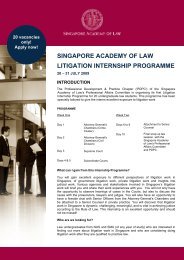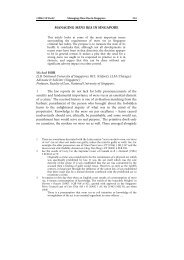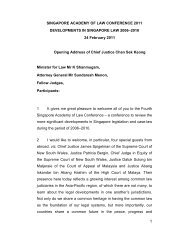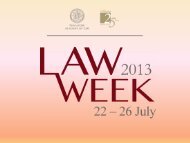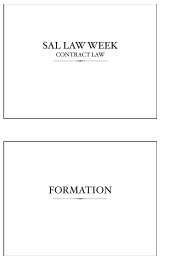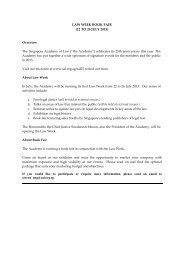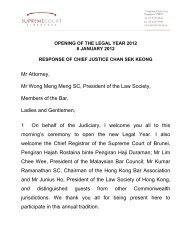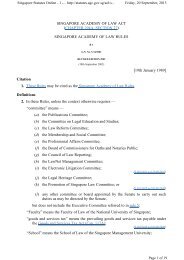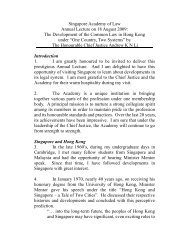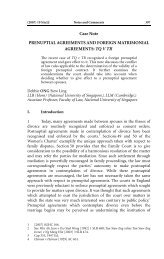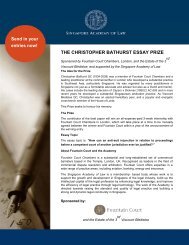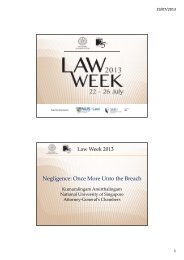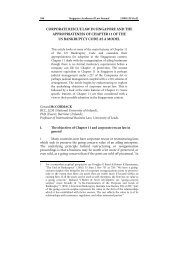View Article - Singapore Academy of Law
View Article - Singapore Academy of Law
View Article - Singapore Academy of Law
You also want an ePaper? Increase the reach of your titles
YUMPU automatically turns print PDFs into web optimized ePapers that Google loves.
15 SAcLJ Matrimonial Assets and the 3 rd Party 223<br />
the parties <strong>of</strong> the proceeds <strong>of</strong> the sale <strong>of</strong> any such asset in such<br />
proportions as the court thinks just and equitable.<br />
8 Does this section give the court dealing with the issue <strong>of</strong> the<br />
division <strong>of</strong> the matrimonial assets the jurisdiction to also deal with 3 rd<br />
party issues, or must a separate civil suit be taken out to deal with the 3 rd<br />
party issues<br />
9 Note: This question is discussed in section 2.1 on the basis that<br />
the civil suit to be taken out in respect <strong>of</strong> the 3 rd party issues is to be<br />
taken out in a court <strong>of</strong> the same jurisdiction as the court dealing with the<br />
ancillary matters—i.e. either both the civil suit and the ancillary matters<br />
would be heard in the High Court or both the civil suit and the ancillary<br />
matters would be heard in the District Court. The particular jurisdictional<br />
issues which would arise if the civil suit is taken out in the High Court,<br />
but the ancillary matters are being heard in the District Court will be<br />
discussed in section 2.2. For the purposes <strong>of</strong> this article, the term<br />
“Family Court” will be used to refer to the District Court which deals<br />
with the ancillary matters.<br />
2.1 Must a separate civil suit be taken out to deal with the<br />
3rd party issues<br />
2.1.1 Yes—Court dealing with ancillary matters has no<br />
jurisdiction to deal with 3 rd party issue<br />
10 One view is that 3 rd party issues should not be dealt with by the<br />
Family Court, as Section 112 appears only to refer to the parties to the<br />
divorce proceedings (i.e. the husband and wife). On this view, a civil suit<br />
should be taken out to resolve the 3 rd party issues, and, if necessary, the<br />
ancillary matters should be adjourned to await the outcome <strong>of</strong> the civil<br />
suit. This approach was taken by the parties in the case <strong>of</strong> Liu Ah<br />
Moy@Liu Ah Lin (m.w.) v Lim Seck Yeow and Another. 9 In this case, the<br />
husband acquired a property in the names <strong>of</strong> himself and his mistress<br />
during the course <strong>of</strong> the marriage, which property was subsequently sold.<br />
The wife filed a divorce petition in the Family Court on 15 April 1999,<br />
and a decree nisi was granted on 18 August 2000, with the ancillary<br />
matters being adjourned to chambers. The wife then filed an originating<br />
summons in the High Court on 20 April 2001 seeking a declaration that<br />
the husband’s mistress held her half share <strong>of</strong> the said property in trust for<br />
the husband and that the husband’s mistress’ share <strong>of</strong> the sale proceeds<br />
9<br />
unreported, Divorce Petition No. 581 <strong>of</strong> 1999



